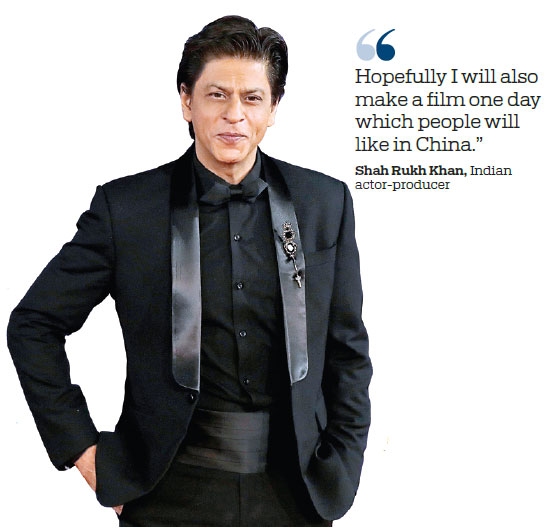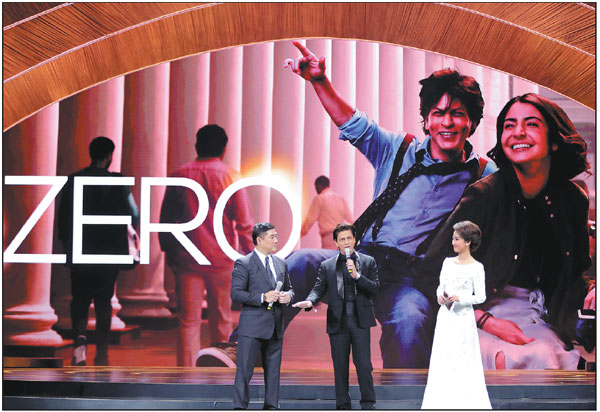Brand Bollywood looks east
Shah Rukh Khan, one of the world's biggest movie stars, finally turns his attention to China. Satarupa Bhattacharjya and Xu Fan report.
On his first visit to China last week, Indian superstar Shah Rukh Khan was greeted by fans at a Beijing airport with squeals of excitement.
Khan, 53, has been described as the biggest movie star globally in Western media that cited audience numbers and income. He has ruled Bollywood for nearly 30 years. But in China many theatergoers are not familiar with his work.
His latest Hindi film, Zero, was shown at the closing ceremony of this year's Beijing International Film Festival on Saturday.
|
Indian actor Shah Rukh Khan (center), Chinese-American actor-host David Wu (left) and Beijing Satellite TV anchor Li Yangwei at the closing ceremony of this year's Beijing International Film Festival, where Khan's latest Hindi film Zero was screened on April 20. Photos by Jiang Dong / China Daily and Provided to China Daily |
In an interview to China Daily at the Four Seasons Hotel in Beijing on Friday, Khan said he didn't become popular abroad through a concerted effort.
"I happened during the time of liberalization (India's economic reforms in the 1990s), a lot of people were traveling, so I guess there was a sense of attachment to me and my films," he said of Western countries, where his films sold, initially to the Indian diaspora and then the local audience.
"Hopefully I will also make a film one day which people will like in China," he said when asked how he would increase his presence in the country.
"The essence is that - can you transcend boundaries and language, perhaps a bit of tradition also, and produce something for people that they enjoy? So when that happens it will happen. Right now it's just nice to be here."
China, the world's second-largest movie market after North America, has witnessed visits by many big names in Hollywood over the past few years.
"I would have loved to come here earlier," Khan said, adding that a factor for the delay was his hectic shooting schedule.
'Wild flight'
Zero, the story of a very short man, was released in India last year but failed at the box office. The film - high on special effects - was screened at the Beijing festival on Saturday after being cut by 30 minutes of its original running time of 164 minutes, according to an industry analyst.
Khan's team and a Chinese company are in talks over the potential of a theatrical release in China.
"I think it was an extremely wild flight to take in a commercial cinema," Khan said during Friday's interview, of critics' response in India to Zero.
The "vertically-challenged hero" alters the typical image associated with his onscreen characters, Khan added.
Zero, he explained, seeks "to show three facets of life, of incompleteness - physical, mental, emotional" and says "let's celebrate it because all of us at any given point in time have one of these things going wrong for us".
Mainstream Hindi cinema tends to celebrate perfection, Khan said. "How nice you look, how cool you are, how many six packs you have, and what fight you do, and what dancing you do, and here is a film which has turned it upside down and taken you on a flight like a fantasy film."
Khan himself has acted in many such movies.
But the India box office is not a barometer for the Chinese audience, as has been previously demonstrated by Hindi film Secret Superstar.
Question of soft power
The space of foreign cinema in China has recently opened up for Bollywood, and films are an increasingly visible aspect of bilateral relations, which go through ups and downs. China and India signed a coproduction treaty in 2014.
Can Hindi films play a greater role in Sino-Indian relations?
"There are political relationships between nations and then there are people-to-people relationships between nations. People-to-people relationships, I think, 99 percent gets sorted with cultural exchange, there's no problem, or sports exchange," Khan, who also owns a cricket team that plays in the Indian Premier League, said.
"I think you overplay the role of art and culture if you start putting it in the political arena, because it's mutually exclusive, if you really ask me."
Khan appeared reluctant to call Bollywood a soft power.
"It sounds good to say it. I'll say it if you want it, if everybody talks about it like that," he said.
"But you know, it's a film, it's a book that you read, you like it, you enjoy it and you get to know about my country a little bit more through my cinema, that's more than enough. I'm not here to change the context of what relationship the nations share because of my film, no."
China allows 34 foreign films for general screening every year.
After years of Hollywood domination, Hindi films have started to resonate with the Chinese audience.
Is the trend likely to continue or even grow?
"If it happens in China, like it's happened for Hollywood films, it's happened for two or three of our Indian films, if it happens, I think it would be very encouraging for any person from anywhere in the world," Khan, who produces movies as well, said.
Besides, language had become less of a barrier with the use of subtitles, he added.
"What China's done in the last 10 years, whatever little I've understood, is quite outstanding, in terms of screens and bringing choices to viewers," he said of the country's cinema infrastructure.
In-house competition
Khan's critics decry the apparent commercialization of his art. But to his legions of fans, especially among India's youth, he is an inspiration - a self-made star, who started out as an outsider in Bollywood, coming from a lower middle-class family and having lost both his parents early.
He began his career on television and became a household name in India by the late 1980s. Since the early '90s, he has played a range of roles in movies.
Still, he is less well-known in China as compared to the other Indian superstar Aamir Khan, whose film Dangal topped the Chinese box office in 2017, in a first for Indian cinema. Years prior, Shah Rukh Khan's film Chak De! India had touched on similar themes: sports, gender equality.
"If Shah Rukh Khan wants to become more popular in China, he should pick some of his new films that are suitable for the Chinese audience, along with good marketing in the next few years," said Tan Zheng, chief executive editor of the Chinese film magazine Dianying Yishu.

Many Chinese moviegoers have taken to Indian films, in part owing to the lack of diversity in domestic cinema, especially on socially-relevant topics.
From that perspective, Aamir Khan has an early-starter advantage.
"It will be difficult for Shah Rukh Khan to replicate Aamir Khan's success in China," Chinese film industry analyst Jiang Yong said.
But going by the failure of Aamir Khan's latest film Thugs of Hindostan in China, there might not be a magic formula for this market.
Contact the writers at satarupa@chinadaily.com.cn

(China Daily Global 04/25/2019 page15)



















